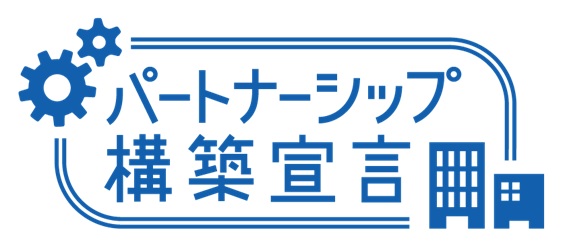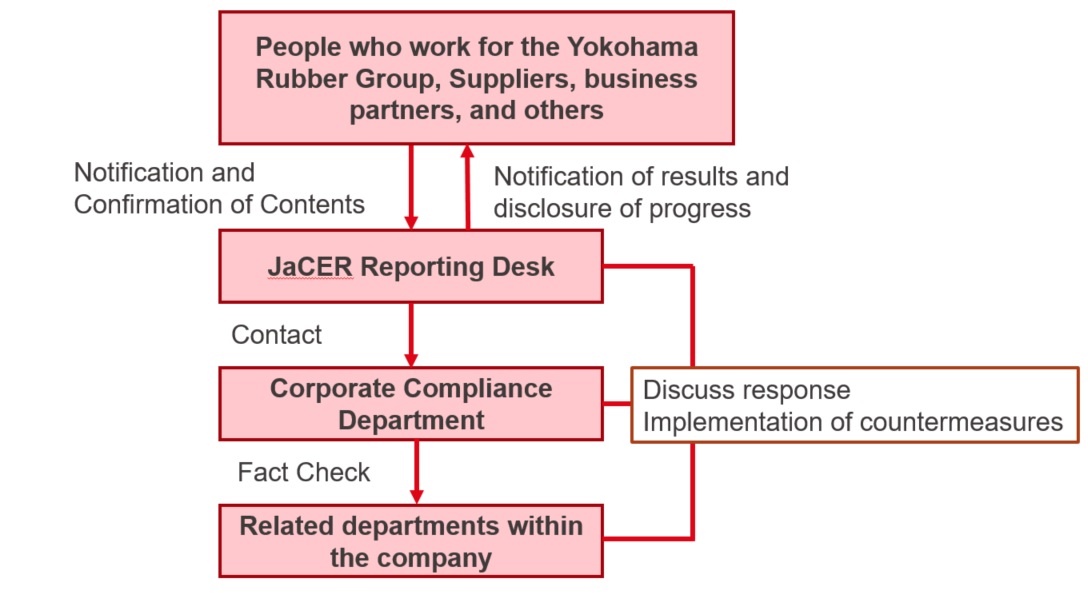Fair Operating Practices
Management
Our position
In order for Yokohama Rubber to be a company that continues providing value to society, partnerships with suppliers based on strong trust relationships are essential. In addition, the scope of corporate social responsibility has expanded to not only include one’s own company, but also suppliers for the procurement of raw materials, goods, and services required for business activities, and we believe that it is necessary for Yokohama Rubber to promote CSR that improves corporate value for suppliers so that it is a win-win relationship for both companies. In particular, because there are suppliers from emerging and developing countries in the upstream of the supply chain for our business, we also recognize the importance of assessment from a social and environmental perspective.
This stance is declared in the Basic Procurement Policy, and the actions that should be taken by employees are stipulated in the Yokohama Rubber Group Action Guidelines.
Policy
Yokohama Rubber’s Basic Procurement Policy
Procurement slogan: "Build relationships of trust with suppliers based on fair and equitable transactions, and strive for co-existence, co-prosperity and mutual development.
-
Fair and impartial business
Yokohama Rubber does business based on fair, equitable, and free competition, and seeks its suppliers from all around the world.
Yokohama Rubber chooses its suppliers on the basis of economic rationality taking into comprehensive account the quality and prices that they offer and their stability of supply, technological development capabilities, and concern for the CSR and environment. -
Partnerships
Yokohama Rubber will build equal and fair cooperative relationships with suppliers through sound business dealings, aiming for the development and growth of both parties.
To build a sustainable society, Yokohama Rubber develops activities for CSR and environment contribution throughout its supply chains. -
Compliance
Yokohama Rubber complies with all relevant legislation and social norms in its procurement activities and preserves the confidentiality of information obtained in the course of business.
It also endeavors to act with moderation so as to avoid causing misunderstandings in light of commonly accepted social standards. -
Harmony with the environment
Yokohama Rubber strives to procure raw materials that have less of an impact on the global environment.
Yokohama Rubber contributes to conservation of biodiversity and sustainable use of natural resources including Natural Rubber.
Yokohama Rubber Group Action Guidelines (Excerpt)
We shall observe not only laws and regulations but also social norms.
<Basic stance of the Yokohama Rubber Group>
- We shall not engage in any activity that is in violation of the competition-related law (antitrust legislation), any acts of bribery, and any other acts that deviate from laws, regulations, or business conventions.
- We shall open our doors wide to all prospective suppliers, engage in just and fair transactions with them, and construct partnerships grounded in observance of laws and regulations and in mutual trust. In addition, we shall take approaches with them to CSR issues (in the aspects of the environment, safety, human rights & labor, and compliance), ascertain the facts of their situation, and proactively assist them in their related efforts.
<To put our basic stance into practice — our action>
- We shall observe the competition-related law (antitrust legislation) in each host country and related laws and regulations (such as the Japanese Act against Delay in Payment of Subcontract Proceeds, Etc. to Subcontractors).
- We shall maintain sound relations with political groups and public administrative authorities, and shall not engage in any acts of bribery, in Japan or any other country or region. We shall not entertain, give any gifts to, or give any money to business partners for the purpose of gaining illicit advantage.
- We shall protect the intellectual property of the Yokohama Rubber Group, including technical information at hand. We shall not illicitly acquire or use intellectual property belonging to third parties, or infringe upon their rights.
- We shall strive to understand and observe the laws and regulations pertaining to the work to which we are assigned, and to preclude the occurrence of risks in the workplace. In the event of any deviation, we shall swiftly make corrections.
- When we suspect the existence of illegal acts in our own conduct or that of others, we shall not ignore it; instead, we shall confirm conformance with the law by utilizing the setup for whistle-blowing.
CSR Procurement Guidelines
In 2009, Yokohama Rubber announced its basic purchasing policy based on the CSR Management Vision. Furthermore, in order to promote CSR activities in the value chain, we have established CSR Guidelines for Suppliers and have held briefings not only internally but also for our suppliers to share our CSR policy and philosophy.
In 2012, we joined the United Nations Global Compact and have been promoting initiatives to address human rights, labor, and environmental issues throughout the value chain.
In 2022, we have revised our corporate environmental policy and announced the three pillars of our environmental agenda ("carbon neutrality," "circular economy," and "living with nature") and our human rights policy..
In line with the revision and implementation of these policies, we have shifted our procurement activities to one that emphasizes CSR and sustainability. In addition, we have revised our CSR Procurement Guidelines in light of changes in social conditions and from the perspective of strengthening our commitment to the three pillars of environmental issues and respect for human rights..
Based on the purpose of this guideline, we expect our suppliers to comply with laws and regulations and their spirit, and to practice them within their own companies, and furthermore, to ask their suppliers to develop and practice the same purpose.
Procurement Policy for the Sustainable Natural Rubber
In 2018, Yokohama Rubber joined the Platform for Sustainable Natural Rubber (GPSNR), which was established by the Tire Industry Project (TIP) of the World Business Council for Sustainable Development (WBCSD) as a founding member. In addition, we have established our own "Sustainable Natural Rubber Procurement Policy" and through activities based on this policy, we aim to achieve sustainability of natural rubber throughout our supply chain.
Procurement Policy for the Sustainable Natural RubberPartnership Building Declaration
On March 25, 2023, we endorsed the objectives of the "Partnership Building Declaration" structure promoted by the Cabinet Office, Ministry of Economy, Trade and Industry, the Small and Medium Enterprise Agency and others, and formulated and announced our "Partnership Building Declaration" in order to build new partnerships by promoting cooperation and coexistence and co-prosperity with all business partners in the supply chain and businesses that create value.

The "Declaration of Partnership Building" framework was established in May 2020 by the "Council for Promoting the Establishment of Partnerships for the Future," with members comprising relevant ministers (the Cabinet Office, the Ministry of Economy, Trade and Industry, the Ministry of Health, Labour and Welfare, the Ministry of Agriculture and Fisheries, the Ministry of Land, Infrastructure, Transport and Tourism, and the deputy chief cabinet secretary), the chairperson of the Keidanren, the chairperson of the Nissho Kai, and the President of the Japanese Trade Union Confederation. The "Declaration of Partnership Building" is a declaration by corporate representatives, from the standpoint of the "ordering party," to build new partnerships by promoting cooperation and coexistence and co-prosperity with business partners in the supply chain and businesses that create value.
Message from a manager
The Yokohama Rubber Group’s Procurement Policy is “to build relationships of trust based on equitable and fair trade in its aim for co-existence, prosperity, and mutual development” and to select suppliers based on economical reasonability under consideration of comprehensive perspectives; their quality, price, stable supply, ability for technology development, and consideration to the environment, human rights, and occupational safety and health. We believe that true CSR consists of expanding business with suppliers that can understand and support our policies in the areas near our production bases and working towards co-prosperity with the region rather than as a single company. We aim to be seen as working on CSR together with our suppliers, and we hold "CSR Supplier Study Meetings".
There were 520 business partners that attended the CSR Supplier Study Meetings in FY2022. These meetings will be held together with the Procurement Division in FY2023.
Kazuhito Yanadori
Officer, Head of Procurement Division
Vision for FY 2023
- We will further collaborate with the procurement departments of our overseas subsidiaries to promote and expand CSR activities that are unified across the YRC Group.
Conduct environmental and human rights risk analysis
Before engaging in business with potential partners, we check their responses regarding issuing CSR reports, compliance with labor-related laws, and relations with anti-social forces.
We also send them our CSR Procurement Guidelines, and check the compliance certificate they return indicating their agreement with our guidelines.
Grievance Mechanisms for Fair Operating Practices
In Japan, the Compliance Promotion Department has established two contact points, which it calls the "Corporate Compliance Hotline" and the "General Counseling Room." In addition, a "Compliance Promotion Manager" has been assigned to every division and affiliated subsidiary. The Compliance Promotion Manager absorbs complaints and consultations from constituents. In February 2018, the Global Whistle-blower System was successively introduced at overseas bases, starting in Asia. The Compliance Officers in procurement and sales departments gather complaints and inquiries from suppliers concerning business transactions through the CSR procurement contact point and other organizations. Complaints concerning social impact are jointly resolved by the Corporate Compliance Department, Legal Department and HR departments in addition to the responsible department. The Corporate Compliance Department confirms the facts related to the consultation by the whistle-blower. The necessary measures are taken in consultation with the procurement departments and sale & marketing departments. The results are directly reported to the whistle-blower if they have disclosed their name. Reminders are issued within the company as necessary if the whistle-blower is anonymous. Please see "Compliance”.
The Yokohama Rubber Group is a member of the Japan Center for Engagement and Remedy on Business and Human Rights (JaCER), which provides a non-judicial grievance redress platform in compliance with the UN Guiding Principles on Business and Human Rights. The Yokohama Rubber Group has established a system to receive complaints from all domestic and overseas stakeholders of the Yokohama Rubber Group through the complaint reporting desk of JaCER, and respond to them appropriately.

Please see “Human Rights”.
Japan Center for Engagement and Remedy on Business and Human Rights (JaCER) Grievance Desk (Go to external site)Priority action items to be addressed
Considering the level of impact of business activities and the level of social interest, the following have been established as our priority action items to be addressed by the Yokohama Rubber Group.


